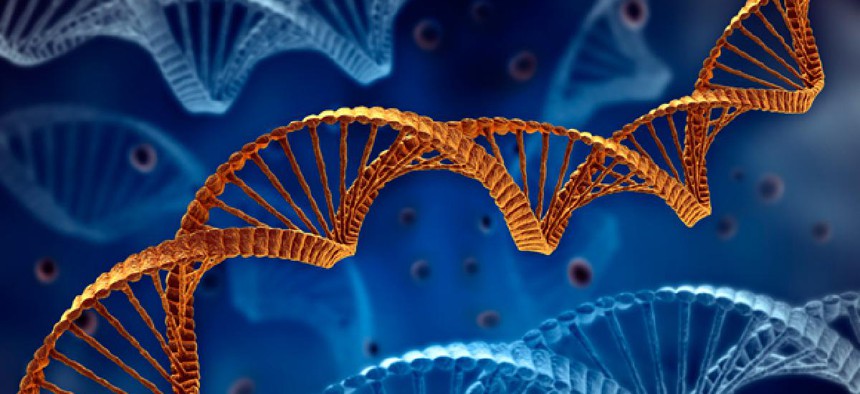DNA Backlog Stymies Development of 'CSI'-like Inventions

Thinkstock
Obligation to help crime labs relieve bottlenecks of untested samples eats up Justice’s resources.
The need to clear a bottleneck of unanalyzed DNA is undermining the Justice Department's ability to drive innovations that could more quickly solve both the backlog problem and new cases, some law enforcement experts say.
While police technology is nowhere close to what audiences see on forensic science dramas such as CSI and NCIS, so-called rapid DNA tools could move law enforcement in that direction.
But, backlog reduction programs account for the majority of DNA funding from the National Institute of Justice, the department's research and development arm and the only federal agency that provides resources for unclogging backlogs at crime labs. A prime area for experimentation is rapid DNA portable technology that can identify suspects in less than 90 minutes.
According to rapid DNA evangelists, Justice has pushed research and development as far as fiscally possible, but backlog expenses are consuming science funding that could provide hard leads earlier in investigations.
NIJ is in the process of drafting its official DNA report for 2012 and does not have final numbers yet, officials said. However, for 2011, the total funding available was $125 million. Of this amount, $88.7 million was spent on the DNA Backlog Reduction Program, $4.4 million to solve cold cases, and $13.5 million for research and development. Hence, three-quarters of the DNA funding NIJ received from Congress went directly to crime labs and police departments to reduce the backlog of DNA evidence and increase laboratory capacity and improve processing time. The bulk of the remaining one-quarter went to training, technical assistance for the field, and for dissemination of information to the field.
An estimated 400,000 rape kits alone sit on lab shelves nationwide, sometimes for decades. In general, backlogs include untested DNA swabs taken from convicted offenders, people arrested for certain felonies, and evidence investigators discover at crime scenes.
Options for hastening screening come with tradeoffs: "Do I let my scientist do some hours of R&D, or do I have that analyst take two more cases out of the backlog," pondered Tom O’Reilly, a former U.S. Justice official who now serves as executive director of the Rutgers University Police Institute.
Shifting DNA technology research to a science-focused agency outside Justice "might facilitate a more rapid development of that product but I also think it needs to be grounded” in real-world practice with assistance from experienced authorities, he said.
The National Academy of Sciences in 2009 argued that major advances in DNA technology are unlikely if the federal government does not remove forensic science from Justice’s jurisdiction. The academy suggested the creation of a new independent agency for DNA research and development that would be free of competing law enforcement priorities.
Because the institute and the FBI "both are part of a prosecutorial department of the government, they could be subject to subtle contextual biases that should not be allowed to undercut the power of forensic science,” the authors of a 2009 academy committee report wrote. “There was also a strong consensus in the committee that no existing or new division or unit within DoJ would be an appropriate location for a new entity governing the forensic science community.”
Institute and FBI officials declined to comment on the recommendation that forensic science be relocated to a different government agency.
Other researchers, however, say that DNA testing advances are constrained by inadequate funding -- period -- not the federal agency in charge.
“The challenge is that NIJ has so few resources to dedicate to this issue and most of those that they receive are earmarked by Congress to go toward backlog reduction efforts,” said Kelly Walsh, a researcher with the Justice Policy Center at the Urban Institute, a nonprofit think tank. Congress has not appropriated Justice enough money to support technology implementation to the same degree as a larger grant-making agency like the National Science Foundation, she added.
Also, even if rapid DNA tools were ubiquitous, the central FBI database does not have the capability to instantly identify matches, Walsh said. The system, called CODIS, only lets analysts enter or search profiles once a week.
Justice officials responded that the department has made some major contributions to the international field of forensic science. CODIS, which the FBI developed more than 20 years ago, now operates national databases for 42 countries, officials said.
CODIS “is a valuable technical advancement for all law enforcement agencies throughout the world,” FBI spokeswoman Ann Todd said in a statement. “CODIS has been particularly helpful to investigations that are very old and no longer producing new leads. Decades ago, crimes from cold cases would have remained unsolved."






